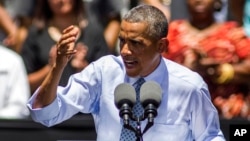The White House says it has no timeline for executive action on so-called corporate inversion deals, in which some American companies are buying foreign companies to reincorporate abroad and pay a lower tax rate.
Billions of dollars are at stake in the squabble over a tax tactic called “inversion,” and President Barack Obama believes is not fair to their American competitors or the hard-working American taxpayer.
"They [these large companies] don’t want to give up the best universities and the best military and all the advantages of operating in the United States. They just don’t want to pay for it," said the president.
The practice is legal, however, and it brings added income for the companies, the bankers and others involved in the structure.
Increased maneuvering
Many large U.S.-based companies, including drug makers and a fast food giant, already have moved or are considering moving their legal corporate residence from the United States to other nations with lower corporate tax rates.
The president has said the growing trend is hurting the economy. Others say a more sensible U.S. tax system, though, would solve this and other problems.
White House press secretary Josh Earnest said Tuesday that if Congress refuses to act, the Obama administration is looking at possible options to respond to the problem of "corporate deserters."
The White House's comments on inversion deals come ahead of Treasury Secretary Jacob Lew’s speech Monday, September 8 about corporate inversions deals.
Tax structure
Northwood University economics professor Tom Nash said the complicated maneuver is driven by the 35 percent U.S. federal tax rate on corporate earnings, a bill that can be raised even higher by state taxes. “We are the highest corporate tax rate system in the industrialized world,” he said.
Nash said unlike most other developed nations, Washington also taxes corporate income earned outside the United States. He said high U. S. taxes also slow investment at home by major companies. When foreign firms have lower expenses, they can offer lower prices than American firms. That hurts the 25 percent of the U.S. economy tied to exports.
Some experts suggest the administration and Treasury could slow the current pace of corporate inversion deals by counting a company’s U.S.-issued debt as equity. The change would make it harder for companies to achieve the necessary majority foreign equity ownership required for reincorporation abroad in an inversion deal.
U.S. Senator Bernie Sanders, an Independent from Vermont, also has said companies that do inversion deals should not be allowed to compete for federal contracts.
Tax reform
Some Republicans and former U.S. President Bill Clinton say the inversion deals are a symptom of the larger problem, which requires comprehensive tax reform to resolve. Obama has agreed to discuss major tax reform.
American Enterprise Institute scholar James Pethokoukis said political bickering will block fundamental tax reform for a while, even though there is wide agreement among economists and members of Congress that U. S. tax laws need change.
“That’s probably [tax reform] not going to happen between now and the end of the year. Not much is going to happen between now and the end of the year, so it becomes kind of a 2015 or 2016 thing,” said Pethokoukis.
In the meantime, Pethokoukis said the president may use executive actions to try to make it harder for companies to use inversion to avoid taxes, but Pethokoukis thinks that will have a limited impact.






